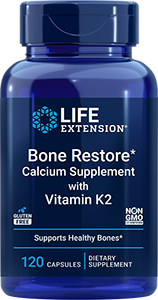Higher serum folate levels linked with reduced biochemical recurrence following prostatectomy
Friday, July 26, 2013. The May-June 2013 issue of the International Brazilian Journal of Urology published the discovery of U.S. researchers of a lower risk of biochemical recurrence following radical prostatectomy among men with higher levels of the B vitamin folate. Biochemical recurrence is defined as a rise in serum prostate specific antigen (PSA) levels after surgery or radiation treatment for prostate cancer, which can indicate a return of the disease.
The study included 135 African American and Caucasian men who had undergone radical prostatectomy between 1991 and 2009 at Veteran Affairs Medical Centers. The men were followed for a median of 36 months, during which 31% developed biochemical recurrence. Folate levels measured prior to surgery ranged from 1.5 to 20.0 nanograms per milliliter (ng/mL), with a median preoperative level of 11.6 ng/mL, and were higher among Caucasians and those with lower preoperative PSA levels. Lead author Daniel Moreira, MD, explained that while the researchers did not use cut-off points for serum folate values, higher levels of folate were independently associated with a lower risk of biochemical recurrence, i.e., the higher the level of folate, the lower the risk of recurrence.
In their introduction to the article, Dr Moreira and his colleagues remark that humans need folate to synthesize and repair DNA, and that when this process is impaired, the risk of cancer is increased. They note that a deficiency in folate has been associated with the development of pancreatic, cervical and colon cancer, however, the role of the vitamin in prostate cancer has been the subject of controversy. "To date, no studies have examined the role of folate in prostate cancer recurrence after primary treatment," they note.
"While the source of the folate in the serum in this study is unknown (i.e., diet vs. supplement), these findings if confirmed in future prospective studies, suggest a potential role of folic acid supplementation or increased intake of folate rich foods to reduce the risk of recurrence," the authors conclude. "However, further studies are required to determine whether folate supplementation or diet modification to increase folate intake can reduce prostate cancer progression." |
 |
 |
|
An article published online on May 16, 2013 in Cancer Prevention Research reports the outcome of a trial conducted in China which found a 50% average reduction in the risk of sporadic colorectal adenomas in older men and women supplemented with folic acid. Colorectal adenomas (polyps), while often benign, can be a precursor to colorectal cancer, with 90% of cases starting as adenomas.
Researchers at Shanghai Jiao-Tong University School of Medicine randomized 791 subjects between the ages of 50 and 80 years with no adenomas to receive 1 milligram (mg) folic acid per day or a supplement without folate for three years. Plasma folate levels were measured upon enrollment and at the end of the treatment period. Colonoscopies administered at the study's conclusion ascertained the location and size of all polyps, which were subsequently examined by a pathologist.
Colorectal adenomas were found in 30.7% of participants who received a placebo and 14.9% of the folic acid group. There was also a reduction in the risk of advanced adenomas among those who received folic acid. A greater risk of adenoma was observed among subjects in either group whose plasma folate levels were lower at the beginning of the study.
"Although several studies have suggested that high-dose folic acid might increase the recurrence and progression of colorectal cancer, only two participants in our folic acid group developed colorectal cancer during three years of follow-up and there was no significant difference with the control group," the authors write. "We believe that 1 mg/day folic acid supplementation is safe and has few side effects."
"Those with low plasma folate should be encouraged to take adequate supplements, and plasma folate should be elevated to an effective therapeutic level, which may reduce the incidence of colorectal adenoma," they conclude. |

Summer Sanders: The Olympic champion carries the torch for varicose vein awareness, by Jon Finkel
Three-step strategy to reverse mitochondrial aging, by Michael Downey
The overlooked importance of vitamin D receptors, by Logan Bronwell
New findings on coffee's cardiovascular benefits, by Julia Pace
Rebuttal to attack against carnitine, by William Faloon, Steven V. Joyal, MD, Luke Huber, ND, MBA, Blake Gossard and Richard A Stein, MD, PhD
Protect and rejuvenate delicate skin around the eyes, by Robert Goldfaden and Gary Goldfaden, MD
If you have any questions about this e-issue please send us an e-mail or call toll-free 1-866-638-8083 anytime. |
|

|

|
|
Bone density loss is not just associated with calcium deficiency, but also with an insufficient intake of a host of other nutrients including magnesium and vitamin D3. In order for calcium to help maintain healthy bones, adequate amounts of vitamin D3, zinc, magnesium, manganese, and other nutrients should be available so that calcium and phosphorus can be incorporated into the bone matrix. Additionally, many forms of calcium are not particularly well absorbed.
To overcome the impediments that preclude aging adults from achieving optimal calcium status, Life Extension offers a proprietary comprehensive mineral formula called Bone Restore which has been designed to support healthy bone density and strength. Bone Restore provides 700 milligrams of elemental calcium from three different forms, along with the critically important nutrients magnesium, boron, zinc, silicon, manganese and vitamin D3 needed for healthy bones. |
|

|
|
Melatonin is well known for its ability to regulate your body's internal clock. However, as you grow older, the secretion of melatonin declines significantly as the pineal gland becomes calcified. Fortunately, melatonin has been studied and shown to be effective for managing disturbances in circadian rhythms. A meta-analysis of 17 studies concluded that melatonin supplementation decreases the time it takes to fall asleep while increasing sleep efficiency and total sleep duration. In fact, melatonin has been shown to increase the speed of falling asleep—and the quality of sleep—in about 60% of people who use it.
Not all people benefit from melatonin when it's in the form of a capsule or tablet. However, some report that by applying melatonin liquid drops under their tongue at bedtime for immediate absorption, they are able to sleep better. This new soothing Fast-Acting Liquid Melatonin has a great tasting natural citrus vanilla flavor and is quickly absorbed for a restful night's sleep. |
|
|



